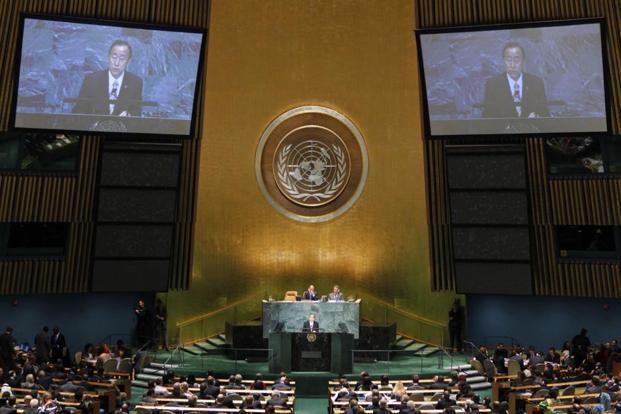- Paris Climate Agreement to Enter into Force Next Month
The Paris Agreement, adopted on December 12, last year in Paris, marks a watershed moment in global efforts to address climate change. Adopted by 196 parties to the UN Framework Convention on Climate Change (UNFCCC) last December in Paris, the Paris Agreement’s central aim is to strengthen the global response to the threat of climate change by keeping the global temperature rise this century well below 2 degrees Celsius above pre-industrial levels and to pursue efforts to limit it to 1.5 degrees Celsius.
The Agreement’s milestone…
The Paris Agreement’s entry into force was extremely swift, particularly for an agreement that required a large number of ratifications and two specific thresholds, according to those in the system.
The Agreement provides that it shall enter into force 30 days after 55 countries, representing 55 percent of global emissions, have deposited their instruments of ratification, acceptance or accession with the Secretary-General. As of now, 73 countries and the European Union have joined the Agreement, exceeding the 55 per cent threshold for emissions.
Nigeria’s percentage greenhouse gases for ratification is 0.57% and President Muhammadu Buhari signed it on September 22, this year at the United Nations General Assembly.
The requirements for entry into force were satisfied recently when Austria, Bolivia, Canada, France, Germany, Hungary, Malta, Nepal, Portugal and Slovakia, as well as the European Union, deposited their instruments of ratification with the Secretary-General.
These countries were the latest to join the Agreement this week, following New Zealand and India, and the 31 countries, including Nigeria, which joined at a special event at the UN on 21 September during the General Assembly high-level week. In early September, the world’s two largest emitters, China and the United States, joined the Agreement, providing the impetus for other countries to quickly complete their domestic ratification or approval processes.
The Agreement will now enter into force in time for the Marrakech Climate Conference (COP 22) in Morocco on November 6, where countries will convene the first Meeting of the Parties to the Agreement. Countries that have not yet joined may participate as observers.
UN’s reaction…
“This is a momentous occasion,” said UN Secretary-General Ban Ki-moon as the latest instruments of ratification were accepted in deposit. “What once seemed unthinkable, is now unstoppable. Strong international support for the Paris Agreement entering into force is a testament to the urgency for action, and reflects the consensus of governments that robust global cooperation, grounded in national action, is essential to meet the climate challenge.”
But he cautioned that the work of implementing the agreement still lay ahead. “Now we must move from words to deeds and put Paris into action. We need all hands on deck – every part of society must be mobilised to reduce emissions and help communities adapt to inevitable climate impacts.”
The Executive Secretary of the UN Framework Convention on Climate Change, Patricia Espinosa said, “Above all, entry into force bodes well for the urgent, accelerated implementation of climate action that is now needed to realise a better, more secure world and to support also the realisation of the Sustainable Development Goals.”
Espinosa noted that “It also brings a renewed urgency to the many issues governments are advancing to ensure full implementation of the Agreement,” she added. “This includes development of a rule book to operationalise the agreement and how international cooperation and much bigger flows of finance can speed up and scale up national climate action plans,” she added.
National commitment…
The Agreement calls on countries to combat climate change and to accelerate and intensify the actions and investments needed for a sustainable low carbon future, and to adapt to the increasing impacts of climate change. Additionally, the Agreement aims to strengthen the ability of countries to deal with the impacts of climate change. It calls for scaled up financial flows, a new technology framework and an enhanced capacity-building framework to support action by developing countries and the most vulnerable countries in line with their own national objectives. The Agreement also provides for enhanced transparency of action and support through a more robust transparency framework and a stocktaking mechanism to ramp up ambition over time.
Additionally, many countries have announced they are committed to joining the agreement this year. For a country that joins the Agreement after it enters into force, the Agreement will become binding 30 days after it deposits its instrument of ratification, acceptance, approval or accession with the Secretary-General. 191 countries have signed the Agreement, signifying their intention to join.


 Naira4 weeks ago
Naira4 weeks ago


 Naira4 weeks ago
Naira4 weeks ago


 Naira3 weeks ago
Naira3 weeks ago


 News4 weeks ago
News4 weeks ago
 Travel4 weeks ago
Travel4 weeks ago




 Naira4 weeks ago
Naira4 weeks ago


 Jobs3 weeks ago
Jobs3 weeks ago
 Naira3 weeks ago
Naira3 weeks ago





















